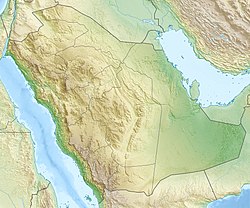Al-Abwa'
Al-Abwa'
ٱلْأَبْوَاء (in Arabic) | |
|---|---|
 Al-Abwa' Location of Al-Abwa' | |
| Coordinates: Coordinates: 23°06′33″N 39°05′40″E / 23.10926°N 39.09433°E | |
| Country | |
| Region | Makkah |
| Government | |
| • Provincial Governor | Khalid bin Faisal Al Saud |
| Time zone | UTC+3 (AST) |
| Part of a series on |
| Islam |
|---|
 |
|
Al-Abwā'[1] (Arabic: ٱلْأَبْوَاء) is a Hejazi village between Mecca and Medina belonging to the area of Rabigh, on the western coast of Saudi Arabia. Muhammad entered it before the Battle of Badr, in 2 Safar AH.[clarification needed]
Significance in Islamic history[]
- The place where Muhammad's mother, Aminah bint Wahb, died.
- It was here that Abu Sufyan ibn al-Harith adopted Islam.[1]
- The Seventh Twelver Shī`a Imām and direct descendant of Muhammad, Musa al-Kadhim, was born in this town.[2][3]
- In 744 CE, after the assassination of the Umayyad Caliph al-Walīd II al-'Abdallah met the Hashimites in the village of al-Abwā', when an oath of allegiance was pledged to his son Muhammad al-Nafs al-Zakiyya as the new Mahdi.[4]
Military campaigns of Muhammad[]
The fourth caravan raid that Muhammad ordered, known as the invasion of Waddan, was the first offensive in which Muhammad took part personally with 70 troops, mostly Muhajirun.[5]
It is said that twelve months after moving to Medina, Muhammad himself led a caravan raid to Waddan (Al-Abwā). The aim was to intercept the caravans of the Quraysh. The raid party did not meet any Quraysh during the raid.[6][7] However, the caravan of the Banu Damrah was raided. Negotiations began and the two leaders signed a treaty of non-aggression. Banu Damrah pledged not to attack Muslims or side with the Quraysh; and Muhammad pledged not to attack, or seize the goods of, the caravans of the Banu Damrah.[5][6]
See also[]
References[]
- ^ a b Abu Sufyan ibn al-Harith, archived from the original on 2009-05-28 on MSA West Compendium of Muslim Texts
- ^ A Brief History of The Fourteen Infallibles. Qum: Ansariyan Publications. 2004. p. 131. ISBN 964-438-127-0.
- ^ "Hazrat Imam Musa Kazim a.s". Archived from the original on 2005-11-04. Retrieved 2006-06-30.
- ^ Abu al-Faraj al-Isfahani, "Kitāb al-Maqātil aṭ-Ṭālibīyīn" (مقاتل الطالبيين), Book of Tālibid Fights
- ^ a b Mubarakpuri, The Sealed Nectar p. 127
- ^ a b Haykal, Husayn (1976), The Life of Muhammad, Islamic Book Trust, p. 217, ISBN 978-983-9154-17-7
- ^ Hawarey, Dr. Mosab (2010). The Journey of Prophecy; Days of Peace and War (in Arabic). Islamic Book Trust. Archived from the original on 2012-03-22. Retrieved 2014-10-04. Book contains a list of battles of Muhammad in Arabic. English version here
- Populated places in Mecca Province
- Saudi Arabia geography stubs


